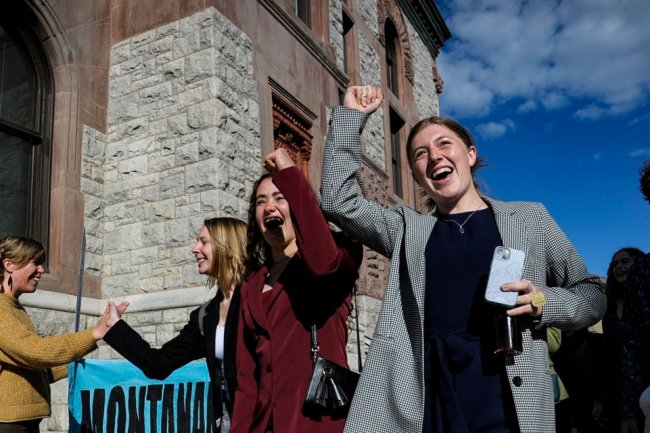Brazil’s Bet on Oil in the Amazon Meets Resistance
President da Silva’s plan to drill draws criticism from Colombian leader, environmentalists Brazilian oil company Petrobras is seeking permission to drill near the mouth of the Amazon River. Pilar Olivares/REUTERS Pilar Olivares/REUTERS By Samantha Pearson and Luciana Magalhaes Updated Aug. 9, 2023 6:07 pm ET SÃO PAULO—Brazilian President Luiz Inácio Lula da Silva has positioned himself as a global leader in the fight against climate change, pledging at a summit of South American leaders this week to fight deforestation as part of “a new Amazonian dream.” There is a significant contradiction, environmentalists say. Da Silv


SÃO PAULO—Brazilian President Luiz Inácio Lula da Silva has positioned himself as a global leader in the fight against climate change, pledging at a summit of South American leaders this week to fight deforestation as part of “a new Amazonian dream.”
There is a significant contradiction, environmentalists say.
Da Silva also backs plans by state-controlled oil company Petrobras to open up the Amazon to oil exploration to position Brazil as one of the world’s biggest oil producers.
As other countries have tried to transition from fossil fuels, Brazil, which has 15 billion barrels of proven reserves and an economy reliant on fossil fuels, has in recent years tapped oil in the Atlantic, passing Kuwait to become the world’s ninth-biggest producer, according to the Energy Institute’s Statistical Review of World Energy.
By opening up new fields in the Amazon and elsewhere, the government says it hopes to make a country that is the largest producer in Latin America the world’s fourth-biggest in the next decade. Of the 30 biggest global oil and gas projects approved last year or expected to get the green light this year, Brazil is home to five, ranking only below Saudi Arabia and Qatar, according to Rystad Energy, a Norwegian consulting firm.

Brazilian President Luiz Inácio Lula da Silva attended a summit of Amazon leaders, which closed Wednesday without consensus on oil exploration.
Photo: Filipe Bispo/Zuma Press

A drilling vessel was anchored in June off the coast of Rio de Janeiro state. Brazil’s economy depends on its fossil-fuel reserves.
Photo: Dado Galdieri/Bloomberg News
In a country that characterizes itself as a leader in the fight against deforestation, Brazil’s energy ambitions raise questions about its role in heading off global warming. Like other developing countries, Brazil is struggling both with international demands to protect the world’s biggest rainforest and the needs of its own people, who want economic development and prosperity.
The two-day summit of the countries that share the Amazon came to an end Wednesday in the Brazilian city of Belém without any agreement over deforestation targets. Participants also failed to reach a consensus on oil exploration, while Colombian President Gustavo Petro, whose government has stopped issuing new oil-exploration licenses, has called for a moratorium in the Amazon.
Brazilian officials say the country’s future prosperity is tied to oil and gas production.
“Brazilians have the right to see the country reach its potential,” Energy Minister Alexandre Silveira said Monday before the summit. He argued that Petrobras should be allowed to prospect for oil in Brazil’s Equatorial Margin, a 1,400-mile strip that includes the northern coastlines of six Amazonian states and the mouth of the Amazon River.

Brazil’s Port of Acu is used as a base for offshore oil operations.
Photo: Maria Magdalena Arrellaga/Bloomberg News
Amazonian oil could be a game changer for Brazil, proponents of more production assert. The Equatorial Margin could contain 30 billion barrels of crude and oil equivalent, matching about 70% of total U.S. reserves, according to estimates by the Brazilian government.
A vast country that relies on long-distance trucks and agricultural machinery, Brazil will likely depend on oil for as much as the next 50 years, said Saverio Minervini, an oil expert at Fitch Ratings in New York. The country’s vehicle fleet won’t go electric soon, he added.
“You can’t operate a tractor in the middle of the savanna and then stop harvesting soy and corn to go plug it in,” Minervini said. Brazil’s domestic demand is so great that without new oil reserves the country risks becoming a net importer of oil between 2030 and 2035, he said, a scenario that economists say could boost inflation, eroding incomes and worsening poverty rates.
Still, Brazil’s environmental-protection agency, Ibama, in May rejected a request from Petrobras to drill near the mouth of the Amazon River, citing incomplete information in the company’s environmental study of the area.
But da Silva said in an interview this month broadcast over radio stations in the Amazon that Petrobras was tweaking its application to gain approval.
“You can keep dreaming about this and I also want to,” da Silva said of the plans. The president said he hopes oil production will create jobs in the poor north and northeastern regions, a swath that is home to one-third of Brazil’s population and three-quarters of the country’s poor.

Brazilian shipyard workers prepare an offshore oil vessel for use by Petrobras.
Photo: RICARDO MORAES/REUTERS

Indigenous people marched in Belém, Brazil, as an Amazon leaders summit opened in the city on Tuesday.
Photo: UESLEI MARCELINO/REUTERS
Environmentalists and members of da Silva’s administration have expressed strong misgivings.
“Even if we manage to reduce deforestation by 100%, if the world does not halt the emission of fossil fuels, we will damage the Amazon all the same,” Brazilian Environment Minister
Marina Silva said Monday.While Ecuador, Colombia and other countries already extract oil in the Amazon, the Equatorial Margin extends across a particularly sensitive part of the forest—the mouth of the Amazon River, which carries the largest volume of freshwater in the world, according to the National Aeronautics and Space Administration’s Earth Observatory. The coast of the Amazon is biodiverse, home to some 80% of Brazil’s mangroves, as well as coral reefs.
Some 80 environmental groups, including Greenpeace and the World Wildlife Fund, wrote a joint letter to Ibama in April calling on the agency to reject Petrobras’s request to start drilling at a block awarded to the company in 2013.
“Just when the exploration of fossil fuels has pushed the planet towards a climate crisis…the plan to drill new oil wells in search of oil and gas at the mouth of the Amazon is of grave concern,” the groups wrote.
Da Silva has said that he sees no environmental risks from extracting oil in the region. Environmentalists counter that the precedent isn’t good. Between 1997 and 2021, there were some 600 oil spills in the Peruvian Amazon, according to a recent report by Oxfam, while pipe ruptures have spewed thousands of barrels of oil into the forest in Ecuador.

A view of Amazon forest in Brazil’s state of Pará, where Belém is the capital city.
Photo: antonio lacerda/Shutterstock
Colombian leader Petro has called for all new oil developments to be blocked in the Amazon, taking a jab at da Silva’s government during the summit by implying the Brazilian leftist was repeating the errors of former President Jair Bolsonaro, a conservative who promoted development in the Amazon. Producing oil in the Amazon represents an “enormous ethical conflict, especially for progressive forces that should be on the side of science,” Petro said.
Though da Silva has promised a radical departure on environmental policy after Bolsonaro’s administration, which recorded a sharp rise in deforestation, both leaders share common ground, political scientists said.
Just as da Silva said Tuesday that the Amazon “is not just about flora and fauna,” but a region in need of jobs and development, Bolsonaro also defended greater use of the region’s resources to spur the economy. Both argued that richer nations must pay Brazil to help fight deforestation.
“Lula is simply following the country’s historic position on the Amazon…that the region is not destined to become a nature reserve, but is a source of natural resources to be used for economic and social development,” said Rafael Cortez, a political scientist at São Paulo-based consulting firm Tendências.
Brazil isn’t alone in struggling to balance curtailing global warming with delivering a growing economy, said Christopher Garman, managing director for the Americas at Eurasia Group. Many European nations, facing fuel shortages because of Russia’s war in Ukraine, turned back to coal, a source of pollution.
“Energy security is not always consistent with the full scope of countries’ environmental agendas,” said Garman.

A refinery in Cubatão, near the Brazilian coastline.
Photo: nelson almeida/Agence France-Presse/Getty Images
Write to Samantha Pearson at [email protected] and Luciana Magalhaes at [email protected]
What's Your Reaction?













